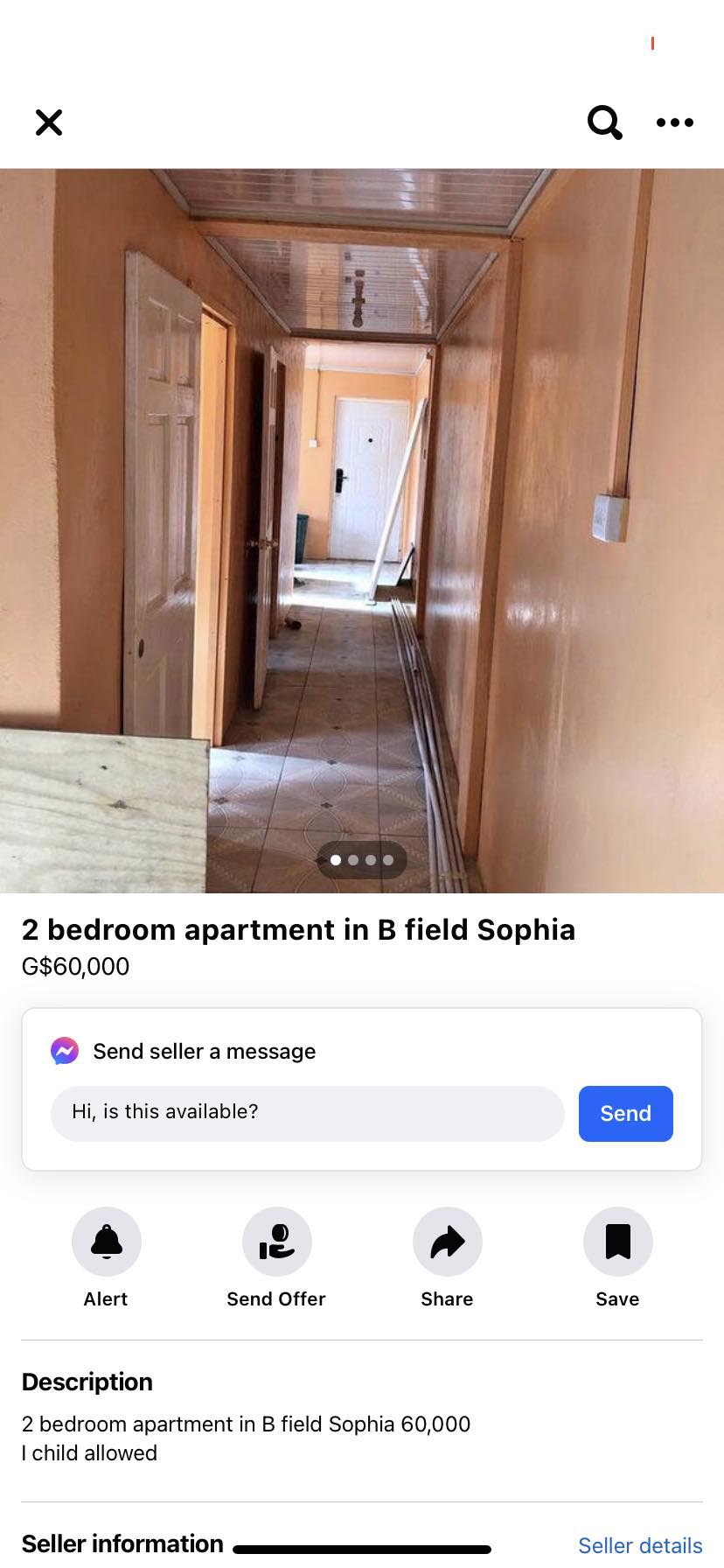-oil industry seen as fuelling increases
By Khadidja Ba
Rental prices in the city have risen so much over the past five years that even renting a habitable one-bedroom apartment for less than $80,000 per month is a challenge.
Additionally, with the recent oil boom and the presence of expatriates, the influx of refu-gees and immigrants escaping crisis situations or just coming to Guyana to study, locals face increasing challenges renting.
In interviews with Stabroek News (SN), young professionals, students, and middle-aged professionals all voiced similar views. A medical professional noted that her rent had soared significantly in the past five years without any prior notice or reasonable justification. Dur-ing another interview with SN, a young professional shared that his rent has increased twice within the past seven years. The first increase was by $20,000 in 2019 and the second was in 2022 even though there hasn’t been any change in his salary or job opportunities. The tenant shared that the reasons given for these increases were that “the landlord wanted to do some upgrades to the house the first time and the second he didn’t give a reason”. While it is understood that this is not the case for every tenant, it has become a trend for many landlords to increase their prices without reason, justification nor accountability.

The rent increases can be largely attributed to there being no price control regulatory body, also contributing to this issue are Guyana’s recent oil boom, the influx of immigrants whether it is those coming from crisis situations, or those coming to study, as well as the increased cost of building materials. Speaking to SN, a realtor who has been in the business for over 10 years, said that landlords have realized that the persons coming to work in the oil companies are doing so with a housing allowance which in most cases allows for in excess of US$2500 ($500,000) per month. He shared that this rate is far above the budget for locals as well as the immigrants coming from crisis situations or to study. A landlord who would have previously received $120,000 per month for a two-bedroom apartment from either one or two working Guyanese, would easily receive $160,000-$170,000 from four or five persons for the same space.
Many realtors locally wish for rentals to be based on the market and the preference of the landlords because “the moment you start doing those kinds of controls, you’re really prohibiting and discouraging people from making investments intro properties because really, these apartment buildings and so that that people are building are being done by people who have saved up their entire lives and they want to service that need. So now to do that, would discourage them.” Additionally, for most realtors, their commission is based on the rental price.
Rectify issues
When questioned about landlords’ willingness in George-town to address infrastructural damage, most tenants indicated a preference for using their own funds to rectify issues rather than enduring the frustration of lengthy delays in repairs. In discussions with several George-town landlords, this trend was attributed to financial constraints faced by landlords, leading to an inability to promptly address all concerns. Additionally, some landlords expressed reluctance to bear the entire cost of repairs for issues in rented apartments or houses.
The correlation between apartment location and pricing is widely acknowledged. Consi-dering Georgetown’s status as a hub for trade and commerce, many individuals opt to reside outside the city to evade the steep costs associated with one-bedroom apartments within Georgetown. However, this decision presents safety and transportation obstacles for those working late hours in the city. Depending on the bus routes available, accessing public transportation becomes exceedingly difficult before and after a certain hour, exacerbating the challenge.
The scarcity of buses, coupled with safety concerns, is exacerbated by some buses exploiting the situation to raise fares. This unregulated practice inconveniences passengers who often feel compelled to comply due to the urgency of reaching home and to work. Despite these challenges, an anonymous realtor highlighted the benefits of new roads and access points linking outlying communities to Georgetown, suggesting that tenants should leave home earlier to ensure punctuality at work. However, this solution holds little merit, as public transportation remains the primary mode of travel for most tenants in outlying areas working in Georgetown. Moreover, the increased congestion on both the Heroes Highway and the East Bank main road undermines any potential time-saving benefits from the new infrastructure.
Tenants contemplating living outside of Georgetown while commuting to work face their own set of obstacles, including traffic congestion and rising gasoline prices. Speaking with Stabroek News, tenants reiterated similar concerns, emphasizing that when factoring in the cost of gas for their commutes alongside rent and other expenses, the overall expenditure matches that of apartment choices within Georgetown.
On the conundrum of apartments being on the higher end cost wise in arguably unfavour-able neighbourhoods, the justification for this is that even though it may not be attractive to the expatriates, it is the hope of the realtors and landlords that the apartments would appeal to the immigrants seeking refuge from a crisis situation or a group of students coming to study. Once again, there is no consideration for the local market.
One of the tenants interviewed posited to SN, “In Guyana there seems to be a primacy to the landlords. The main problem with this is that a landlord fundamentally has the capital to not only buy a property but in many cases also to build the building, whereas the tenant has no recourse and in Guyana, no legal protections. Landlords need to be obligated to provide basic amenities and there should be a rental cap. The rental cap should be determined by the type of dwelling, considering factors such as location, amenities, and adherence to zoning regulations, which, although existing in Guyana, are often overlooked. There should be no allowance for charging rent in areas unsuitable for residential purposes or lacking the necessary amenities.”
Globally, social media platforms are inundated with grievances about the surge in the cost of living. In Guyana, tenants have taken to platforms like Facebook and Reddit over the past five years, expressing frustration over how this escalating cost, alongside soaring rental rates, is compelling them to seek supplementary sources of income. Landlords, in turn, justify their rent hikes by citing the heightened cost of living, particularly the increased expenses for materials needed for apartment construction, development and maintenance. One landlord in particular stated that being a retiree and depending on the income from her tenants, “because of the cost of living going up, I need to raise the rent so I can cover my bills”. The interrelation between the landlord’s cost of living and being impacted by the overall cost of living, along with the subsequent hike in rent for tenants, can be financially crippling for certain individuals. For some, their new rent prices constitute 20% of their monthly income, while others face a whopping 50% of their monthly income going to their apartment rentals.
A group of realtors voiced similar advice when speaking with SN as it relates to the high cost of living, the increasing rental prices and the seeming surge in Guyanese to rent apartments. All of them urged Guyanese to exercise patience and to take the time to build their financial portfolios before venturing into renting. They all shared instances in their youth where they saved and prepared for when they needed to rent and wished those looking to rent would do the same.
Together, tenants interviewed by SN advocate for increased legal assistance for tenants, an establishment and maintenance of a regulatory authority to oversee rental conditions and enforce building codes, ensuring apartments meet living standards and the distribution of information regarding tenant rights.
The government has been actively providing housing alternatives, exemplified by initiatives such as the Young Professionals Programme, catering to individuals who opt not to rent. Thus far, this administration says it has allocated over 32,000 house lots nationwide, in line with its goal of distributing 50,000 lots by 2025.





